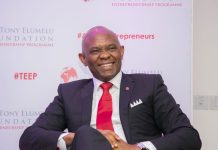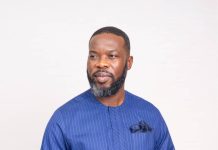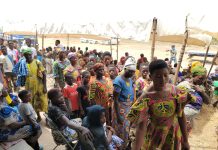A record 13 donors announced new pledges for the Fund. The Fund’s previous annual resource mobilization record was US$ 129 million, which it reached three years ago at COP24 in Katowice, Poland.
The new amount far surpassed the Fund’s 2021 resource mobilization goal of US$ 120 million and doubled the US$ 116 million it raised a year ago. It will also make a considerable dent in its US$ 300 million-plus pipeline of project proposals that are under development but have not yet been funded.
New pledges include first-time contributions from the United States, Canada (at the national level) and Qatar and several contributions that were significantly higher than in the past from some of the Fund’s other contributors such as Spain, Quebec, and Ireland, and still others such as Finland who returned to contribute after several years. It also included new multi-year commitments to the Fund, from Norway and Ireland, which followed Sweden’s first multi-year pledge to the Fund a couple of years ago.
The 2021 pledges announced included Germany (USDeq approx. 58.2 million); the United States (US$ 50 million); Spain (USDeq 34.9 million); the United Kingdom (USDeq 20.6 million); Sweden (USDeq 15.1 million applied from its USDeq 53 million pledge for 2019-2022); Switzerland (USDeq 10.9 million); Norway (USDeq 8.38 million applied from its 300 million NOK pledge for 2021-2024); Finland (USDeq 8.1 million); Canada national government (USDeq 8.1 million); Quebec regional government (USDeq 8.1 million); Ireland (USDeq 5.8 million applied from its EUR 10 million commitment over 2021-2022); the Flanders Region of Belgium (USDeq 3.49 million); and Qatar (USDeq 500,000).
It is possible that more contributions for the Fund may come in before the end of the conference.
The Adaptation Fund had high hopes entering COP26, which has drawn some 40,000 attendees, as one of the conference’s top goals was to enhance adaptation action. Governments, beneficiaries and supporters of the Fund’s concrete actions on the ground for the most vulnerable and innovative programmes came through in the end.
Mattias Broman, Adaptation Fund Board Chair
“As the Adaptation Fund has continued to face record demand over the last several years, our hopes for urgently needed adaptation action on the ground and further support for the tangible, effective, scalable and innovative actions the Fund provides to the most vulnerable have been exceeded with these record-breaking pledges that have doubled the amount we raised last year,” said Adaptation Fund Board Chair Mattias Broman, of Sweden.
“We extend our deep appreciation to all of the contributors, both long-time and new alike, as well as those who have made multi-year commitments. It will reach those on the ground who need it most with concrete solutions and go a long way to helping many more vulnerable communities adapt and build resilience to climate change, while empowering country ownership and local leadership in adaptation.”
In addition to its concrete projects in serving the Paris Agreement and pioneering Direct Access to build country ownership in adaptation, the Fund has adapted and continued to deliver throughout the pandemic and actively expanded its funding windows to adapt to the climate urgency by launching new grants to foster scale-up of projects, innovation and learning in adaptation, as well as Enhanced Direct Access. Its Board also doubled the amount of funding countries can access for single-country projects.
Ovais Sarmad, Deputy Executive Secretary of the UN Framework Convention on Climate Change, said the Fund has delivered on its mandate, improving resilience for more than 31 million beneficiaries while restoring ecosystems and establishing early warning systems which have had positive impacts on vulnerable people on the frontlines of climate change.
Although adaptation finance is still far behind where it needs to be and parties have called for a balance between mitigation and adaptation, he said progress is being made and voices are being heard.
“We must keep the momentum going. I really and sincerely appreciate all of your efforts and your support for the Adaptation Fund,” he said.
H.E. Mr. Jochen Flasbarth, State Secretary, Federal Ministry for the Environment, Nature Conservation and Nuclear Safety, of Germany The largest contributor to the Fund over the years with US$ 513 million in total contributions, Germany again stepped forward with the highest contribution for the Fund this year, at USDeq 58 million.
“The Adaptation Fund is doing good things on the ground, close to the communities, is enormously innovative given the quite limited amount of money and is seeking ways to most efficiently spend the money,” said H.E. Mr. Jochen Flasbarth, State Secretary, Federal Ministry for the Environment, Nature Conservation and Nuclear Safety, of Germany, at the dialogue, adding praise for the Fund for raising its cap on single-country projects and its country-led nature.
“We are very happy to be part of this family. H.E. Mr. John Kerry, Special Presidential Envoy for Climate of the U.S. H.E. Mr. John Kerry, Special Presidential Envoy for Climate of the U.S., said the stakes could not be higher at COP26 to reduce emissions and increase adaptation efforts for years to come for those already feeling climate impacts around the world. He outlined President Biden’s emergency plan for adaptation and resilience and announced the first ever-contribution for the Adaptation Fund at US$ 50 million. “We see the Adaptation Fund as a key partner in this effort,” he said.
“It’s led the way in supporting developing countries as they adapt to climate change, from pioneering a Direct Access approach in building institutional capacity, investing in small-scale locally led adaptation initiatives, to the new innovation facility that will scale up and accelerate new adaptation practices and technologies, and the Adaptation Fund will bring us closer for sure to a climate-resilient future. We think working with the Adaptation Fund, building on an excellent track record that helps people and protects ecosystems and continues to accelerate our work, we can get there.
Adaptation is clearly more urgent, clearly more important, clearly more on the table than it has been at any other time and it should be. We have to prepare for what the warmer world is going to bring. And that does need investing in a climate resilient future and supporting those communities and countries amongst us that are the most vulnerable.” In announcing a new USDeq 34.96 million contribution to the Fund, Ms. Valvanera Ulargui, General Director of Spain’s Climate Change Office, said, “This is the year that adaptation has more importance than ever. We need to be bold, we need to invest. Spain has been part of the Fund’s Board since the very beginning. It is very close to our hearts. Impacts of climate change are becoming more evident. We are very happy to participate with this Fund.”
Ulargui added that Spain will collaborate with the Fund to strengthen mainstreaming efforts with all climate funds, and enhance access to information and resources for developing countries. “We must act now to stop climate change from pushing more people into poverty. We know that climate impacts disproportionately affect those already most vulnerable,” said H.E. Anne-Marie Trevelyan, Secretary of State for International Trade and COP26 Champion for Adaptation and Resilience, of the United Kingdom, in a release announcing UK’s USDeq 20.68 million pledge to the Fund, who also spoke at the dialogue. “We are aiming for significant change that will ultimately contribute to sustainable development and a climate resilient future for all, with no one left behind.”
A firm contributor of the Fund for over 10 years, Sweden signed a multi-year pledge to the Fund in 2019 – the Fund’s first ever, which has since paved the way for others such as Norway and Ireland to follow suit. It applied USDeq 15.1 million of it this year, amounting to a quarter of the four-year pledge. H.E. Mr. Per Olsson Fridh, Minister for International Development and Cooperation of Sweden said, “The world is in need of a new economic model that takes nature and its ecosystems into account, and its precious resources that we are dependent on. As we scale up adaptation finance, we have to make sure that those resources are channeled to protect the most vulnerable communities.
The Fund is a nimble, well-run, effective and experienced player in the adaptation field. I want to highlight the Fund’s work with building local and national capacity, and community-led adaptation, which are crucial to withstand the devastating impacts of climate change.” Fridh also acknowledged the Fund’s efforts to mainstream gender equality into project design and enhance civil society engagement. He encouraged all donors to invest in multi-year pledges to enhance financing predictability.
“This is the best way to reach the most vulnerable communities,” he added. in speaking of the Fund’s successes and innovations and reaffirming Switzerland’s USDeq 10.9 million pledge announced earlier, H.E. Matthias Bachmann, of the Swiss Agency for Development and Cooperation, said, “The contribution will help finance the Adaptation Fund’s very effective work in supporting the efforts of the most vulnerable people around the world to adapt to the relentless impacts of the climate crisis. We also look forward to the cooperation and (potential) operationalization of Article 6 of the Paris Agreement, which will hopefully generate more resources for the Fund.”
In announcing Norway’s four-year 300 million NOK pledge to the Fund, of which USDeq 8.38 million will be applied in 2021, Mr. Bard Vegar Solhjell, Director General of the Norwegian Agency for Development Cooperation, said he is very pleased to be entering into the agreement, which follows Sweden’s four-year pledge to the Fund a couple years ago. “We do this first because we trust the Fund. I think it’s a great partner. It’s a Fund that can finance national institutions directly and it’s also an innovative fund. Through the innovation pillar the Adaptation Fund pilots innovative practices, products and technologies, which can be scaled up by other climate funds such as the Green Climate Fund on a larger stage.”
Meanwhile, Finland returned to contribute to the Adaptation Fund for the first time since 2014, reflecting the growing urgency of adaptation and recognition of the Fund’s key effective work. “The health of our ecosystems is at risk. The gap between adaptation needs and available finance is still too large,” said H.E. Mr. Ville Skinnari, Minister for Development Cooperation and Foreign Trade, of Finland.
“Finland as a part of the champions’ group of adaptation finance is working together with vulnerable developing countries to improve access to adaptation finance. We do appreciate the Fund’s continued relevance in the climate finance architecture facilitating Direct Access and delivering adaptation solutions on the ground.
The Innovation facility will hopefully pave the way for more intensive private sector engagement in adaptation. I would like to highlight the Fund’s importance on inclusiveness and coherence. Working together with other actors and funds will enable both innovative and scaled-up adaptation solutions. Participation of women, girls, and marginalized groups ensures no one will be left behind. Let us not forget adaptation also brings many opportunities. Reduced risk and avoided losses carry potential to try innovative things and increase productivity and numerous environmental benefits. We are excited to engage and support the Adaptation Fund’s key role in accelerating this work.”
H.E. Ms. Patricia Fuller, Ambassador for Climate Change for Canada, reaffirmed Prime Minister Justin Trudeau’s earlier announcement of Canada’s first-time national pledge of USDeq 8.1 million to the Fund, as Canada joins ongoing Fund contributor Quebec (at the regional level) in providing key leadership in climate finance. “There is much more to be done through the Adaptation Fund, and the time do it is now. Canada recognizes that the importance of climate change adaptation is critical now more than ever for developing countries, in particular for those most at risk,” she said.
“We recognize not only the financial value of the Adaptation Fund, but the importance of the leadership role that developing countries play in its management. We are honored to be a part of this discussion to join forces with others to support developing countries’ full ownership of adaptation projects, from planning through to implementation.”
Ireland joined Sweden and Norway in making a multi-year pledge, committing to contribute EUR 10 million to the Fund from 2021-2022, of which USDeq 5.8 million will be applied this year. It also marks by far the largest contribution from Ireland to the Fund to date. “Ireland is a global champion of adaptation, in particular for the most vulnerable. Adaptation is the main focus of our climate finance and we endorse the principles of locally-led adaptation,” said H.E. Mr. Eamon Ryan, Minister for Environment, Climate and Communications of Ireland.
The contributions of regional governments, which have been a key factor in the Adaptation Fund’s history with more than 20 contributions over the years, made their mark at COP26, as well. The Government of the Canadian Province of Quebec, which contributed to the Fund for the first time last year, delivered the highest ever contribution from a regional government to date with USDeq 8.1 million this year. H.E. Mr. Benoit Charette, Minister for Environment of Quebec, announced the tripling of their previous contribution during the dialogue.
“We believe this will provide real benefit to those who are most in need,” he said. “This makes Quebec one of the most active subnational governments. Those hardest hit are often least able to respond. This is the time to increase ambition.” In announcing the Belgium Regional Government of Flanders’ USDeq 3.49 million contribution, H.E. Ms. Zuhal Demir, Flemish minister for Justice and Enforcement, Environment, Energy and Tourism, said increasing floods and droughts have given climate change adaptation full attention.
“I fully support the approach of the Adaptation Fund,” she said. “This will go for work where it matters the most.” Continuing to show the importance of contributions in the fight against climate change at all levels, the Fund also received its first-ever pledge from a non-annex 1 country earlier this year, from Qatar, with a US$ 500,000 pledge. H.E. Mr. Khalifa Al-Kuwari, Director General of the Qatar Fund for Development, said it is important for Qatar to finance climate change adaptation for developing countries that are particularly vulnerable.
“This partnership helps build resilience in the most vulnerable countries as well as food security, disaster resilience, ecosystem-based adaptation, and sustainable solutions,” he said. The dialogue also heard from previous supporters of the Fund, as well as recipient governments and civil society. Ms. Frederica Fricano, Director of European Affairs and International Actions on Climate Change of Italy praised the Fund’s pioneering Direct Access modality which empowers country ownership in adaptation. “The Adaptation Fund is an important delivery channel for country-driven adaptation finance. It is one of the oldest climate institutions,” added H.E. Ms. Yasmine Fouad, Minister for Environment of Egypt, which has two AF-funded projects.
“It has allowed countries to build long-term resilience in many ways. We greatly welcome all of the contributions. Rest assured it will be money well spent and will help reach more vulnerable countries with urgently needed adaptation solutions and actions on the ground. Many of the projects implemented by the Fund are scalable projects and ensure country ownership. In Egypt the second project was an upscaled project of the first one. The Fund is really making a positive difference. Projects are also making a difference beyond climate, including in health during the pandemic. But it will need to increase its available resources to keep pace with high demand.”












































